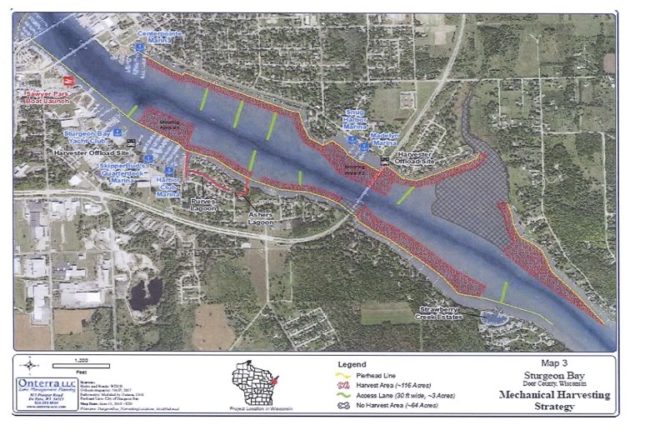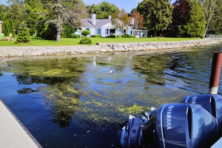Options Discussed to Raise More Revenue for Water-weed Harvesting
- Share
- Tweet
- Pin
- Share

Sturgeon Bay’s Joint Parks and Recreation Committee/Board discussed during an Aug. 24 meeting the possibility of either a tax increase or charging a fee to private dock owners who could benefit from the city expanding its aquatic-plant harvesting in 2023.
“How do you put more money into the program, but not, say, raise taxes for the person on 7th Avenue who has nothing to do with the water, just to get the homes along the water better service?” said District 4 alder Spencer Gustafson, a committee/board member. “For me, I automatically thought about that fee that goes to the commercial marinas. Maybe we have to look at fees that [go] to waterfront homes.”
Discussion about raising more revenue did not lead to any conclusions, but, like Gustafson, committee/board member Randy Morrow said he opposed raising taxes in general to benefit private dock owners.
“I do think the cost should go right to the dock owners,” he said. “I think having it spread out that way to the dock owners, I think you can get creative and cover that cost almost overnight.”
The Sturgeon Bay Common Council heard this summer from Memorial Drive residents who complained about the weeds and asked the city to do more.
“It’s been a pretty hot topic here,” said municipal services director Mike Barker. “Last year and this year have been horrible for the aquatic weeds here in the bay.”
Barker said more than a million pounds of aquatic plants have been removed from the bay this summer as part of the city’s harvesting efforts.
“Some people might make you think that the city is not doing anything, or the city is not doing nearly enough,” he said. “Some people think that it’s every bit as important as plowing streets in the winter – dealing with water weeds out there on the bay.”
Morrow also suggested looking at a possible fee increase for what marinas are being charged, as well as charging a fee for boaters to raise additional revenue for aquatic-plant management.
The city spends around $100,000 annually on the aquatic-plant management program and receives about $53,000 back on charges to the marinas. That revenue comes from slip owners who pay a $40 fee that the marinas pay to the city.
Barker said the city picks up more weeds at the ends of docks than from the water in marinas.
“[The marinas] have their people go around, use a pitchfork [and] put them on the end of their docks, and we just pull up,” he said.
To his knowledge, Barker said, there haven’t been any instances of water weeds affecting the operation of boats in the navigable channel.
“Do they pose a little bit of a problem when people are going in and out of their docks right at their house? Quite possibly,” he said. “I’d kind of expect that. We’re no different than any lake in the Midwest. I’ve been fishing in a lot of lakes, and I’ve never seen one free of weeds. It’s not unique to Sturgeon Bay.”
Aquatic-plant Management Plan
Barker said many people take issue with the current map showing the areas where the Department of Natural Resources (DNR) permits the city to harvest aquatic plants from the bay.
“A lot of complaints we receive from people are [that] the weeds are around their docks and around their boats, and we don’t come in there and clean them out,” Barker said. “And they are 100% correct: We do not go in there and clean it out, just like no one comes to my house and mows my front yard, just because it’s up against the street.”
Neither does he recommend the city change that strategy.
“While we’re satisfying maybe 200 people by keeping their little beaches or around their personal docks open, everyone else is going to suffer,” he said. “We don’t have the millions of dollars to throw into new equipment.”
Barker said one of the city’s three operational aquatic-plant harvesters has required “a lot of work through the year to keep it up and functioning,” and a new conveyer that loads the weeds into trucks – ordered for this year – won’t arrive until September or early October, after this year’s aquatic-plant harvest concludes.
They’re also looking at replacing one of the two trucks used to haul water weeds to the compost site.
“Just constantly hauling that much weight, with water dripping out of it nonstop, it takes a toll on the actual trucks that haul [aquatic plants],” he said.
The committee has oversight of the city’s aquatic-plant management plan that will be updated for next year. Barker said he wanted to send out requests for proposals in December for the 2023 harvesting season, sign a contract in January and hold public-information meetings to gather input on the plan early next year.
DNR to Be Invited to Future Meeting
The city may harvest aquatic plants over 116 acres of the bay, as permitted by Mary Gansberg, the DNR’s water-resources biologist.
Doing more than that, given the current staffing and equipment, would result in a larger area being harvested less frequently, or the current amount of acreage being managed as much as it is now, Barker said.
Committee/board chair Helen Bacon suggested they contact the DNR about strategies to mitigate plant growth, such as regulating lawn fertilizer that might run off into the bay. Committee members favored having Gansberg appear before them in October or November.


